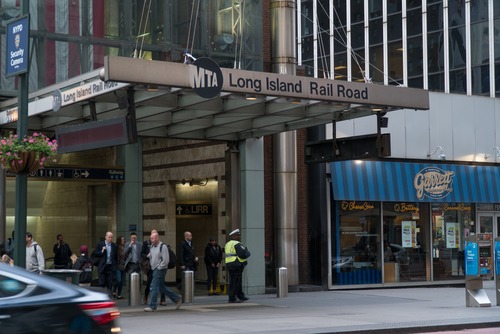
The Metropolitan Transportation Authority (MTA) announced Thursday that, despite the COVID-19 pandemic, it was able to meet a host of performance measures on New York City Transit, Metro-North Railroad, and Long Island Rail Road service lines.
The transit authority said it was able to meet high on-time performance levels, lower incident levels, and high customer journey time performance, as well as make improvements through infrastructure investments.
MTA said New York City Transit (NYC Transit) subways saw an average weekday on-time performance rate of 88.6 percent and a Customer Journey Time Performance (CJTP) rate of 85.8 percent. Average weekday major incidents dropped to 24.3 per month for 2020, the lowest rate since the metric was first tracked in 2015. Crews were also able to replace over 900 mechanical signal timers with digital units and completed work on nearly 22,000 feet of track and 32 switches.
NYC Transit buses also saw improvement in CJTP, increasing 5.1 percentage points to 77.4 percent over the last year and adding 16.4 new miles for bus lanes and busways.
“Prioritizing safety and the improvement of subway and bus performance was a goal of mine from Day One on the job,” said MTA NYC Transit Interim President Sarah Feinberg. “I look forward to maintaining this momentum as we continue to see riders return to the system and provide them with the reliable service all New Yorkers deserve.”
On the Long Island Rail Road (LIRR), 95.9 percent of trains operated on-time in 2020, the best performance since 1979. Crews for LIRR replaced 22 witches, installed 73,244 concrete ties, and installed a record 287,314 feet of continuous welded rail.
“Over the last few years, we have systematically begun attacking our infrastructure needs with a new sense of urgency,” said LIRR President Phil Eng. “The success of this proactive approach under LIRR Forward is now providing our customers a more reliable and safer trip. This is the direct result of all our crafts rising to the challenge and working together to accomplish critical work in compressed timeframes while still delivering essential service. Know that we are committed to continuous improvement and will never rest on our laurels.”
For Metro-North Railroad, trains saw a 97.9 percent on-time performance. Crews installed more than 49,700 new cross ties, 1,641 bridge timbers, and 36 new switches, cutting the number of delays caused by signal or switch failures by two-thirds. Crews also installed more than nine miles of continuously welded rail, surfaced 95 miles of track, and replaced six grade crossing pads.
“These record performance metrics are a direct result of the hard work of our entire Metro-North team, who come together to ensure that our customers receive the safe and reliable service that they deserve,” said Metro-North President Cathy Rinaldi. “As COVID vaccinations continue and the pandemic recedes, it is Metro-North’s unwavering commitment to the safety of our customers and the reliability of our service that will bring our customers back to the railroad.”